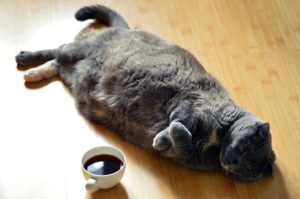
Is your cat overweight? Find out and see what you can do about it!
Weight is an essential issue for any pet. An unhealthy weight can cause significant health issues later on, such as orthopedic problems, skin disorders, kidney malfunction, inflammation, and more, ultimately shortening your pet’s life. While the phenomenon of a “fat cat” is not uncommon and almost iconic, pet parents should look to these areas to tell if their cat is fat.
How to Tell If Your Cat Is Fat
How can you tell for certain that your cat is fat? Many pet owners might be accustomed to their cat’s looks and not be able to tell at first glance. If you want to know for sure, observe your feline from three different angles.
When looking at your cat from the back, you should be able to see its figure narrowing at the waist. A tubby cat will not have this accentuation. Likewise, from the front, you should be able to see an indication of its ribs and hips. When you pet your cat’s sides and chest, you should be able to feel its ribs. If you cannot feel its ribs, or you notice it has an overall round shape, it likely could trim down a little.
Note that different cats will weigh more or less depending on their breed. For more detailed information on what your cat’s ideal weight might be, Everhart Veterinary Medicine can help!
Diet
Diet could be one of the key reasons for your fat cat. We might love to shower our pets with treats, but too much of any good thing is never good in the end. One should consult a veterinarian to know the ideal dietary amount per cat.
If the amount of food per day is not the issue, it could be the type of food. A feline should typically receive 24-35 calories per pound. Putting your cat on a diet could involve either changing the food, using special diet food, or going on a weight management diet.
Exercise
Diet and exercise go hand in hand for a healthy feline lifestyle. Like people, it does not necessarily take much each day for a cat to remain active. About half an hour of play or a toy they love can be enough.
Health
Perhaps your cat leads a healthy lifestyle with the best of cat cuisine and plenty of activity, both mental and physical, and it still is overweight. In that case, the problem could be an underlying health issue, which your veterinarian will need to diagnose. Call Everhart Veterinary Medicine in Baltimore and Pasadena, Maryland!
Trust the Care of Your Pet to the Professionals at Everhart Veterinary Medicine!
At Everhart Veterinary Medicine, our veterinary professionals strive to provide your pet with the very best of veterinary care. We believe that the best care for your pet should be provided by experienced, compassionate, and knowledgeable veterinary professionals. With two Maryland locations in both Baltimore and Pasadena, we are always ready to welcome your pet as a new patient! Give us a call today at 410-355-3131 or 410-793-7670! For more information, as well as updates on veterinary news and topics, visit us on Facebook, Twitter, or LinkedIn!
This entry was posted on Monday, July 12th, 2021 at 3:30 pm. Both comments and pings are currently closed.